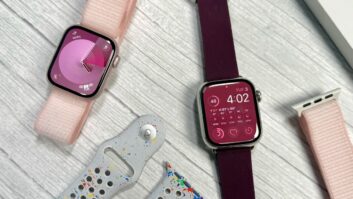Internet music portables are headed in the direction of greater differentiation, based on recent product plans announced by CE- and PC-industry suppliers.
Thomson and Pine Technology USA, for example, are planning hybrid CD/MP3 headphone portables, and Philips is developing an Internet music portable that will decode at least five compressed-music formats when it’s launched in the first quarter.
Fremont, Calif.-based Pine has developed its first two branded products for the U.S.: an MP3 portable and a hybrid MP3/CD portable. The company also makes motherboards, modems and other PC products on an OEM basis.
Beginning in September, Pine plans retail shipments of the D’Music SM-320V MP3 portable and an FM-equipped version dubbed the SM-320 at suggested retails of $189 and $219, respectively. Both come with 32MB of embedded solid-state memory and a slot for a 32MB Smart Media card.
They also double as a voice recorder with 4.5 hours of voice-storage capacity, and they can store PC files such as spreadsheets for transfer between PCs. They run on two AAA batteries.
Both are available on web sites and will be in Fry’s in September and Office Depot in October, said sales and marketing VP Brian Hamilton.
The D’Music SM-200C hybrid portable plays audio CDs and MP3-encoded CDs but features no solid-state memory. It’s due at the end of November at a suggested $299, with 10-second antishock memory buffer. The SM-200C’s battery life is 8 hours on 4 AA alkalines.
Thomson will ship its own CD/MP3 portable in the U.S. late in 2000, if it’s happy with consumer demand for its Lyra portable and competing products.
The hybrid’s internal MP3 decoder would play back music from MP3 CDs and from a removable Type 1 or 2 CompactFlash card, the memory-card format used by Lyra. The CD/MP3 player will probably ship with Real Audio G2 decoding, a spokesman said. Pricing hasn’t been set.
Most likely, he added, the portable will be designed to accept software downloads, so it could decode additional compression formats.
Without committing itself to ship dates, Thomson also has shown dealers mockups of MP3-equipped shelf systems, car CD players, a CD boombox, and a three-CD component carousel changer.
The latter product would incorporate an MP3 decoder, CompactFlash slot, and the ability to play MP3 CDs made on a 100-disc changer/CD-recorder, which was also shown in mockup form.
The changer would incorporate MP3 encoder/decoder to create MP3 files from the stored CDs. The MP3 files could potentially be transferred to a CompactFlash card as well, the spokesman said. A hundred MP3 CDs would play up to 1,500 hours of music, he added.
Another future Thomson product is a high-capacity CompactFlash card, due in the U.S. by Christmas of this year, with about 120MB of memory for use with the Lyra portable, the spokesman said.
Thomson has reaffirmed plans for U.S. September shipments of its Lyra portable, available at $199 and $249 for 32MB and 64MB versions that both play the MP3 and G2 formats.
The first units available might be shipped without the watermarking technology approved by the SDMI group because a licensing agreement with watermarking-technology supplier Aris hadn’t been finalized in mid-September. Discussions were set to resume the week of September 20 in New York City.
If the Lyra is not shipped with full SDMI Phase I compliancy, buyers will be able to download Internet software to add the watermark technology at a later date, the spokesman noted.
Similarly, the Lyra can be upgraded to play about four more formats when additional decoding software is loaded into Lyra’s internal DSP.
Philips’ first Internet music portable is due in the first quarter in the U.S. with a targeted retail price of about $200.
It will initially play back music stored in the MP3, Real Audio G2, Liquid Audio, a2b and EMMS compression formats, said Guy Demuynck, managing director of Philips’ audio business group.
But the square silver-colored device is capable of playing additional formats when other decoding formats are uploaded into it, Demuynck said. Philips hasn’t announced the type of removable memory card it will use.
Other companies are also planning to get into the act, including PC accessories supplier Best Data Products. The company has introduced a portable MP3 player, the $239 Cabo, for sale through retailers and web sites.
The device’s transparent blue case incorporates 64MB embedded memory and a slot for a 32MB SmartMedia card. It operates for up to 10 hours on two AAA batteries. It ships with music-management software for PCs, a microphone, earbuds, and the ability to store 250 phone numbers.
Chatsworth, Calif.,-based Best Data’s product line includes modems and graphics accelerators.













